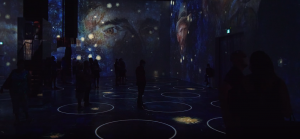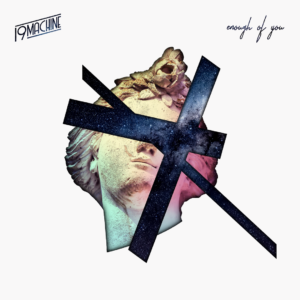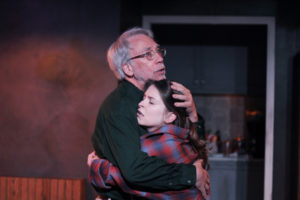Pictured above: Emilie Modaff as Gui (left) and Vahishta Vafadar as Mathilde/Photo: Sally Blood
Editor’s Note: This is an expression by Danielle Levsky in response to Les Innocents in a character monologue form; it is followed by information about the work and process.
It stormed the night I saw Les Innocents. The stairwells and corridors of the Preston Bradley Center mimicked the hollowness I felt when I myself visited the Paris Catacombs. Lights flickered, living and dead ghosts moved past me, and I, again, wondered what it would feel like to be one of the six million spirits residing in the 200 miles of limestone, seven stories below the city streets.
The audience follows Gui (Emilie Modaff), a composer who has lost their muse Mathilde (Vahishta Vafadari) and is therefore unable to compose music. We followed them through the hallways and into the catacombs, where we met Jacques (Amanda Forman), a quarry worker. This character may have been inspired by the quarry worker who built a miniature palace chiseled from stone within the catacombs over five years, from memory. The worker died in a quarry collapse as he was building an access point to share his creation with the public.
What I saw in Jacques and Gui were two souls committed to their craft, but not to the people around them; this undying devotion would lead to their own individual downfalls.
・・・
LA VERSION FRANÇAISE:
Dans ce monologue dramatique, MATHILDE est assis dans un café à Paris avec Gui et leurs amis artistes. Les artistes rient et MATHILDE rit aussi, mais avec force; elle regarde le public avec peur, confusion et déception.
MATHILDE: Les voici, encore. Et me, revoilà.
(battre)
Gui recontre assis au moins deux fois par semaine avec Camille Saint-Saëns, Georges Bizet et Claude Debussy. Chaque jour, pour quatre heures, Gui compose et écrive au piano. Chaque jour, dans la nuit, Gui me fait l’amour. Pendant le week-end, Gui rencontre des artistes dans les salons et boit avec les meilleures artistes de la ville. Et de temps en temps, Gui me regarde et me dit:
(imitant les gestes grandioses de Gui) “Mathilde, tu es la belle de la Belle Epoque!”
(retourne à son propre comportement diminué) (battre)
Je connais leur emploi du temps, comme une horloge. Comme les secondes que Gui éveille, voici pourquoi je suis en vie.
(battre)
Pourquoi suis-je en vie?
(battre)
(baissant la voix) Quand Gui dort ou joue du piano, je me promène dans les rues de Paris. Parfois, je suis assis à Le Chat Noir et écoute Eric Satie au piano. Je m’amuse dans le silence, l’obscurité, jusqu’à ce qu’Eric me voie. Il me sourit et me fait un clin d’œil. Ensuite, j’imagine ce qui se passerait si je quittais le bar et trébuchais autour de Montmartre pour tomber dans les mains d’un assassin.
(battre)
Je veux composer ma propre musique. Mais c’est trop tard pour moi. Gui me montre leurs œuvres, de temps en temps, et quand je leur propose une suggestion, Gui se marre.
(battre)
Je suis leur belle. Mais je ne fais pas partie de leur époque.
ENGLISH TRANSLATION:
In this dramatic internal monologue, MATHILDE is sitting with Gui and their fellow artist friends in a cafe in Paris. The artists laugh and MATHILDE laughs forcefully along with them. She stares into the audience with fear, confusion and disappointment.
MATHILDE: Here they are again. And here I am.
(beat)
Gui sits with Camille Saint-Saëns, Georges Bizet, and Claude Debussy at least twice a week. Every day, for four hours, they compose and write at their piano. Every day, in the night, they make love to me. On weekends, they meet with the other artists in salons and drink with the city’s finest. And every so often, they look at me and tell me:
(imitating the grandiose gestures of Gui) “Mathilde, you are the belle of the Belle Epoque!”
(returns to her own diminished demeanor)
(beat)
I know their schedule like clockwork. Like the seconds they spend awake are why I am alive.
(beat)
Why am I alive?
(beat)
(lowering her voice) When Gui sleeps or plays, I wander the streets of Paris. Sometimes I stumble into Le Chat Noir and listen to Eric Satie on his piano. I enjoy myself in the silence, the dark, until Eric sees me, smiles, and winks at me. Then, I imagine what would happen if I were to leave the bar and stumble around Montmartre and into the hands of an assassin.
(beat)
I want to make music. But it’s too late for me. Gui shows me their works, every now and then, and when I offer up a suggestion, they laugh. I’m their belle.
(beat)
But I’m not part of their epoque.
・・・
Les Innocents/The Innocents is inspired by a concert held in the Paris Catacombs on April 3, 1897, where music by Chopin and Saint-Saens was featured. The title is inspired by the first cemetery emptied into the Catacombs, Cimetière des Innocents, in the late 1700s.
Dubbed an “immersive, queer thriller,” the audience follows Gui into the Catacombs to conjure spirits, confront the dead, and discover whether or not Mathilde died for their love, her own love, or for loneliness.
Les Innocents/The Innocents performances occur Thursday through Sundays at Preston Bradley Center 941 West Lawrence Avenue through November 4. More information can be found at resdicovertheatre.com/the-innocents.








Be First to Comment